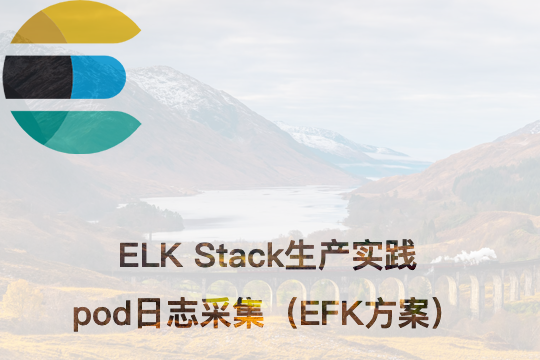
ES8生产实践——pod日志采集(EFK方案)
本篇为ELK Stack生产实践专题系列第十九篇,本篇主要内容是介绍使用Fluent Bit+Fluentd方案采集k8s集群所有节点的containerd、kubelet服务日志以及所有的pod日志。并以自定义日志采集处理为例,演示如何配置过滤策略实现自定义日志处理并写入到到ES中。
EFK日志采集方案
方案介绍
- 实现目标:k8s集群所有节点container和kubelet服务日志采集、k8s集群所有pod日志采集并对自定义应用日志实现过滤和清洗操作。
- fluent bit采集:相较于fluentd而言,fluent bit更加轻量,且内置了pod日志解析插件和service日志采集功能无需编写复杂的日志处理配置。因此使用daemonset方式在每个节点部署fluent bit容器,可以最大程度减少资源占用。
- fluentd处理:虽然fluent bit足够轻量,但日志解析处理能力弱于fluentd。fluentd支持更多的过滤处理插件,对于常用的数据处理操作,fluentd可以直接通过ruby语法处理,而fluent bit需要开发lua脚本才能实现。
- fluentd集群方案:使用Fluentd充当日志聚合层,接收fluent-bit日志后统一进行处理操作,最后批量写入elasticsearch集群。这样做的好处是当k8s集群规模过大时,避免了过多的fluent-bit连接ES写入数据,导致ES连接资源消耗过高、网络拥堵、连接资源竞争等问题。
- fluent bit+fluentd方案:将日志采集与日志处理拆后分别交由不同的组件负责,最大程度发挥各个组件的优势,使得配置文件更加清晰易读,便于后期维护管理。
架构图

fluent bit部署与配置
参考文档
https://docs.fluentbit.io/manual/installation/kubernetes
开启journal日志持久化
默认情况下fluent-bit通过socket获取journald日志,但如果使用pod运行fluent-bit时无法获取journald日志,需要配置journald参数,改为存储至宿主机本地/var/log/journal目录下,然后pod挂载宿主机/var/log目录进而读取kubelet和container日志。
[root@work1 ~]# vim /etc/systemd/journald.conf
Storage=persistent
[root@work1 ~]# systemctl restart systemd-journald
部署fluent-bit
拉取helm包
[root@master1 ~]# helm repo add fluent https://fluent.github.io/helm-charts
[root@master1 ~]# helm pull fluent/fluent-bit --untar
[root@master1 ~]# cd fluent-bit/
[root@master1 fluent-bit]# ls
Chart.yaml ci dashboards README.md templates values.yaml
修改配置
[root@tiaoban fluent-bit]# vim values.yaml
image:
repository: harbor.local.com/elk/fluentbit # 修改为本地仓库地址
tag: v2.1.9 # 指定镜像版本
config:
# 默认未配置文件缓冲,新增文件缓冲配置
service: |
[SERVICE]
Daemon Off
Flush {{ .Values.flush }}
Log_Level {{ .Values.logLevel }}
Parsers_File /fluent-bit/etc/parsers.conf
Parsers_File /fluent-bit/etc/conf/custom_parsers.conf
HTTP_Server On
HTTP_Listen 0.0.0.0
HTTP_Port {{ .Values.metricsPort }}
Health_Check On
storage.path /var/log/flb-storage/
storage.sync normal
storage.checksum off
storage.backlog.mem_limit 5M
# 默认配置文件只采集pod和kubelet服务日志,新增containerd日志,并排除Fluentd和Fluent-bit日志采集
inputs: |
[INPUT]
Name systemd
Tag containerd.service
Systemd_Filter _SYSTEMD_UNIT=containerd.service
Read_From_Tail On
[INPUT]
Name systemd
Tag kubelet.service
Systemd_Filter _SYSTEMD_UNIT=kubelet.service
Read_From_Tail On
[INPUT]
Name tail
Path /var/log/containers/*.log
Exclude_Path /var/log/containers/fluent-bit*, /var/log/containers/fluentd-*
multiline.parser docker, cri
Tag kube.*
Mem_Buf_Limit 5MB
Skip_Long_Lines On
# 原始字段中的time值不是标准时间格式,直接写入es会报错,可移除time字段,使用@timestamp标识时间
filters: |
[FILTER]
name record_modifier
match kube.*
remove_key time
# 将所有采集到的数据直接转发至后端fluentd服务。
outputs: |
[OUTPUT]
Name forward
Match *
Host fluentd.logging.svc
Port 8888
storage.total_limit_size 5M
hotReload:
enabled: true # 按需开启配置热更新
image:
repository: harbor.local.com/elk/fluentbit # 修改为本地仓库地址
部署fluent-bit
[root@tiaoban fluent-bit]# kubectl create ns logging
namespace/logging created
[root@tiaoban fluent-bit]# helm install fluent-bit -n logging . -f values.yaml
NAME: fluent-bit
LAST DEPLOYED: Sat Sep 16 14:46:03 2023
NAMESPACE: logging
STATUS: deployed
REVISION: 1
NOTES:
Get Fluent Bit build information by running these commands:
export POD_NAME=$(kubectl get pods --namespace logging -l "app.kubernetes.io/name=fluent-bit,app.kubernetes.io/instance=fluent-bit" -o jsonpath="{.items[0].metadata.name}")
kubectl --namespace logging port-forward $POD_NAME 2020:2020
curl http://127.0.0.1:2020
验证
[root@tiaoban fluent-bit]# kubectl get pod -n logging -o wide
NAME READY STATUS RESTARTS AGE IP NODE NOMINATED NODE READINESS GATES
fluent-bit-4z7zj 1/1 Running 0 10m 10.244.1.16 master2 <none> <none>
fluent-bit-56ff6 1/1 Running 0 10m 10.244.5.170 work1 <none> <none>
fluent-bit-6lzqr 1/1 Running 0 10m 10.244.2.232 master3 <none> <none>
fluent-bit-72h7w 1/1 Running 0 10m 10.244.0.29 master1 <none> <none>
fluent-bit-ttb4x 1/1 Running 0 10m 10.244.3.254 work3 <none> <none>
fluent-bit-xnrms 1/1 Running 0 10m 10.244.4.12 work2 <none> <none>
fluentd部署与配置
构建fluentd镜像
由于fluentd镜像未安装elasticsearch、geoip、rewrite-tag-filter插件,如果在pod的init阶段在线安装插件经常会导致拉取超时无法正常启动。因此需要提前构建包含相关插件的fluentd镜像,并上传至harbor仓库中。
[root@tiaoban fluent]# cat Dockerfile
FROM fluent/fluentd:v1.16.2-debian-1.1
USER root
ADD GeoLite2-City.mmdb /fluentd/GeoLite2-City.mmdb
RUN buildDeps="build-essential libgeoip-dev autoconf automake libtool libffi-dev" \
&& sed -i "s@http://deb.debian.org@http://mirrors.aliyun.com@g" /etc/apt/sources.list \
&& apt-get update \
&& apt-get install -y --no-install-recommends $buildDeps \
&& gem sources --add https://gems.ruby-china.com/ --remove https://rubygems.org/ \
&& fluent-gem install fluent-plugin-elasticsearch fluent-plugin-geoip fluent-plugin-rewrite-tag-filter \
&& apt-get autoclean \
&& gem sources --clear-all \
&& rm -rf /var/lib/apt/lists/* \
&& rm -rf /tmp/* /var/tmp/* /usr/lib/ruby/gems/*/cache/*.gem
[root@tiaoban fluent]# docker build -t harbor.local.com/elk/fluentd:fluentd:v1.16.2 .
[root@tiaoban fluent]# docker push harbor.local.com/elk/fluentd:fluentd:v1.16.2
fluentd部署配置
fluentd使用deployment控制器部署多副本集群,用于接收fluent bit的数据然后写入es的数据流中。
- fluentd-conf.yaml
[root@tiaoban fluentd]# cat fluentd-conf.yaml
apiVersion: v1
kind: ConfigMap
metadata:
name: fluentd-conf
namespace: logging
data:
fluent.conf : |-
<source>
@type forward
port 8888
bind 0.0.0.0
</source>
<match *.service>
@type elasticsearch
host elasticsearch-es-http.elk.svc
port 9200
default_elasticsearch_version 8
user elastic
scheme https
password 78HOWor95Iiot076O59xq2Am
ssl_verify false
data_stream_name logs-${tag}-fluentd
include_timestamp true
<buffer>
@type file
flush_interval 5s
path /fluentd/buf/service-logs.*
</buffer>
</match>
<match kube.**>
@type elasticsearch
host elasticsearch-es-http.elk.svc
port 9200
default_elasticsearch_version 8
user elastic
scheme https
password 78HOWor95Iiot076O59xq2Am
ssl_verify false
data_stream_name logs-pod-fluentd
include_timestamp true
<buffer>
@type file
flush_interval 5s
path /fluentd/buf/pod-logs.*
</buffer>
</match>
- fluentd-svc.yaml
apiVersion: v1
kind: Service
metadata:
name: fluentd
namespace: logging
spec:
selector:
app: fluentd
ports:
- port: 8888
targetPort: 8888
- fluentd.yaml
apiVersion: apps/v1
kind: Deployment
metadata:
name: fluentd
namespace: logging
spec:
replicas: 3
selector:
matchLabels:
app: fluentd
template:
metadata:
labels:
app: fluentd
spec:
containers:
- name: fluentd
image: harbor.local.com/elk/fluentd:v1.16.2
resources:
limits:
memory: "128Mi"
cpu: "500m"
ports:
- containerPort: 8888
volumeMounts:
- name: fluentd-conf
mountPath: /fluentd/etc/fluent.conf
subPath: fluent.conf
volumes:
- name: fluentd-conf
configMap:
name: fluentd-conf
部署fluentd服务
[root@tiaoban fluentd]# ls
Dockerfile fluentd-conf.yaml fluentd-svc.yaml fluentd.yaml GeoLite2-City.mmdb
[root@tiaoban fluentd]# kubectl apply -f .
configmap/fluentd-conf created
service/fluentd created
deployment.apps/fluentd created
访问验证
此时查看kibana索引管理,已成功创建了pod、containerd、kubelet日志数据流。

service日志处理
虽然我们已经将service日志存储在了elasticsearch中,但观察发现默认情况下日志内容都在MESSAGE字段中,通常情况下,我们只会关注日志等级为warning和error的日志,因此我们需要对该字段内容做解析处理。
日志内容分析
观察container日志可知,MESSAGE中包含了日志时间、日志等级、日志内容三部分内容

观察kubelet日志,MESSAGE中包含了日志时间、处理函数、日志内容三部分内容

新增service日志处理规则
我们可以通过正则匹配插件实现MESSAGE字段值解析操作,需要注意的是正则匹配时一定是所有字段都包含,否则会因为匹配不到而无法过滤处理操作。
- service-conf.yaml
apiVersion: v1
kind: ConfigMap
metadata:
name: service-conf
namespace: logging
data:
service.conf : |
<filter containerd.service>
@type parser
key_name MESSAGE
reserve_data true
<parse>
@type regexp
expression /time="(?<time>[^"]+)" level=(?<level>[^ ]+) msg="(?<msg>[^"]+)"/
time_key time
time_format %Y-%m-%dT%H:%M:%S.%N%z
</parse>
</filter>
<filter kubelet.service>
@type parser
key_name MESSAGE
reserve_data true
<parse>
@type regexp
expression /[EI](?<time>\d{4} \d{2}:\d{2}:\d{2}.\d{6}) +\d* (?<class>\w*).go:\d*] (?<message>.*)/
time_key time
time_format %m%d %H:%M:%S.%N
timezone +08:00
</parse>
</filter>
<match *.service>
@type elasticsearch_data_stream
host elasticsearch-es-http.elk.svc
port 9200
default_elasticsearch_version 8
user elastic
scheme https
password 78HOWor95Iiot076O59xq2Am
ssl_verify false
data_stream_name logs-${tag}-fluentd
include_timestamp true
<buffer>
@type file
path /fluentd/buf/service-logs.*
</buffer>
</match>
访问验证
查看containerd服务日志,已成功解析了MESSAGE字段内容,并新增了@timestamp、leve、msg字段

查看kubelet服务日志,同样成功解析了MESSAGE字段内容,并新增了@timestamp、class、message字段

自定义日志解析
需求分析
默认情况下,fluent bit会采集所有pod日志信息,并自动添加namespace、pod、container等信息,所有日志内容存储在log字段中。
以log-demo应为日志为例,将所有日志内容存储到log字段下无法很好的解析日志内容,因此需要编写fluentd解析规则,实现日志内容解析。

新增自定义日志处理规则
使用rewrite_tag_filter插件,匹配到container_name字段值为log-demo的事件时,新增myapp.log标签,接下来对myapp.log标签的事件进一步做解析处理操作。
- myapp-conf.yaml
apiVersion: v1
kind: ConfigMap
metadata:
name: myapp-conf
namespace: logging
data:
myapp.conf : |
<match kube.**>
@type rewrite_tag_filter
<rule>
key $.kubernetes.container_name
pattern log-demo
tag myapp.log
</rule>
</match>
<filter myapp.log>
@type parser
key_name log
<parse>
@type regexp
expression /^(?<logtime>[^|]+) \| (?<level>[A-Z]*) *\| __main__:(?<class>\D*:\d*) - (?<content>.*)$/
time_key logtime
time_format %Y-%m-%d %H:%M:%S.%L
</parse>
</filter>
<filter myapp.log>
@type record_transformer
enable_ruby
<record>
content ${record["content"].gsub("'", '"')}
</record>
</filter>
<filter myapp.log>
@type parser
key_name content
<parse>
@type json
</parse>
</filter>
<filter myapp.log>
@type geoip
geoip_lookup_keys remote_address
geoip2_database /fluentd/GeoLite2-City.mmdb
backend_library geoip2_c
<record>
geoip_city ${city.names.en["remote_address"]}
geoip_latitude ${location.latitude["remote_address"]}
geoip_longitude ${location.longitude["remote_address"]}
geoip_country ${country.iso_code["remote_address"]}
geoip_country_name ${country.names.en["remote_address"]}
geoip_postal_code ${postal.code["remote_address"]}
geoip_region_name ${subdivisions.0.names.en["remote_address"]}
</record>
</filter>
<match myapp.log>
@type elasticsearch_data_stream
host elasticsearch-es-http.elk.svc
port 9200
default_elasticsearch_version 8
user elastic
scheme https
password 78HOWor95Iiot076O59xq2Am
ssl_verify false
data_stream_name logs-myapp-default
include_timestamp true
<buffer>
@type file
flush_interval 5s
path /fluentd/buf/myapp-logs.*
</buffer>
</match>
访问验证
查看kibana索引信息,已成功创建名为logs-myapp-default的数据流。

查看logs-myapp-default字段信息,已成功解析了日志内容。

完整资源清单
本实验案例所有yaml文件已上传至git仓库。访问地址如下:
github
https://github.com/cuiliang0302/blog-demo
gitee
https://gitee.com/cuiliang0302/blog_demo
参考文档
fluent bit转发事件至fluentd:https://docs.fluentbit.io/manual/pipeline/outputs/forward
构建自定义fluentd镜像:https://github.com/fluent/fluentd-docker-image#31-for-current-images
fluentd重写事件tag:https://docs.fluentd.org/output/rewrite_tag_filter
查看更多
微信公众号
微信公众号同步更新,欢迎关注微信公众号《崔亮的博客》第一时间获取最近文章。
博客网站
崔亮的博客-专注devops自动化运维,传播优秀it运维技术文章。更多原创运维开发相关文章,欢迎访问https://www.cuiliangblog.cn
更多推荐
 已为社区贡献8条内容
已为社区贡献8条内容






所有评论(0)